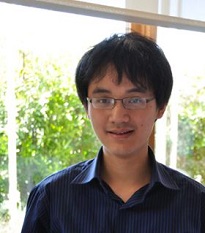

Zhi Yang, Ph.D. Assistant Professor
Zhi Yang is an Assistant Professor of Biomedical Engineering at the University of Minnesota. He is also a researcher in MnDRIVE Robotics, sensors and advanced manufacturing. He received his PhD training with Professor Wentai Liu on integrated bioelectronics. Professor Yang’s research interests are in the areas of implantable electronics, neuro-artificial intelligence, and integrated circuits. He has directed 20 projects with a total amount exceeding $5 million. The current research is supported by federal funding agencies such as NSF, NIH, and DARPA. Professor Yang is a key contributor in the DARPA HAPTIX program for inventing a cutting edge neural AI chip that has enabled amputee subjects to control a robotic hand with life like dexterity. He is a scientist and innovator, who develops bioelectronics therapies to treat diseases and disorders where current drug or surgery based therapies fall short.
Jian Xu, Ph.D.Researcher
Jian Xu is a research scientist in the Department of Biomedical Engineering at the University of Minnesota. He graduated with a BS and PhD in Electrical Engineering from Zhejiang University in 2007 and 2012 respectively. From 2011 to 2015, he worked as a Ph.D. student, research fellow, and senior research fellow in the Department of Electrical and Computer Engineering at the National University of Singapore. He studies mixed-signal integrated circuits, including high-precision low-power data converters, low-noise neural amplifiers, and power and data management. His current work focuses on design and validation of novel neural recording and stimulation devices for closed-loop neuromodulation. He also works on MRI compatible neural devices.
Wenfeng Zhao, Ph.D.Researcher
Wenfeng Zhao is a postdoctoral researcher in the Department of Biomedical Engineering, University of Minnesota. He graduated with a BS and MS from Huazhong University of Science and Technology in 2007 and 2009, and a PhD degree from the National University of Singapore in 2014. From 2014 to 2016, he worked as a research fellow in the Department of Electrical and Computer Engineering, National University of Singapore. His areas of interest include neural recording, neural data compression and transmission, and low-power neural instrumentation.

Tong Wu Ph.D Student
Tong Wu is a PhD candidate in Biomedical Engineering at the University of Minnesota. He got a BS from Huazhong University of Science and Technology in 2010 and a MS from Zhejiang University in 2012. He worked as a research associate from 2012 to 2014 in the Department of Electrical and Computer Engineering at the National University of Singapore. He studies VLSI neural data compression, large-scale neural signal processing, and neural recording.
Anh Tuan (Jules) Nguyen Ph.D Student
Anh Tuan Nguyen is a PhD student in Biomedical Engineering at the University of Minnesota. He obtained his B.Eng. in Electrical Engineering (1st Class Honour & outstanding thesis) from the National University of Singapore in 2014. He was ranked 3rd among students in the high school exit examination in Vietnam in 2010. He studies low-noise neural recording, large-scale recording and stimulation, and MRI compatible neural devices.

Wing-kin (Teris) Tam Ph.D Student
Teris is a pre-doctoral research assistant at the University of Minnesota and a 4th year PhD student from the National University of Singapore. He obtained a B.Sc.(1st Class Honour) and a M.Phil. in Biomedical Engineering from the Hong Kong Polytechnic University. He developed a Brain-computer Interface system for stroke rehabilitation during his master research. He then worked for two years in the Hong Kong SAR government undergoing professional training in medical device management. His fields of research include neural decoding, spike detection and massively parallel neural signal processing.
Diu Khue (Katherine) Luu Ph.D Student
Katerine Luu is a PhD student in Biomedical Engineering at the University of Minnesota. She obtained her Bachelor of Social Science in Economics (1st Class Honour) from the National University of Singapore in 2015. She was ranked 3rd among students in the high school exit examination in Vietnam in 2009. She studies super-resolution neural recording techniques and their applications in neuromodulation.

Rohit MurakondaM.S Student
Rohit is an MS Student in Biomedical Engineering at the University of Minnesota. He got his Bachelor of Biomedical Engineering from the University of Minnesota in 2018. His areas of interest include wireless power transfer for implantable microsystems and deep learning.

Luke BeggsUndergraduate Student
Luke is a undergraduate student majoring in Electrical Engineering and minoring in Computer Science. He is a member of the Minnesota pep band and Engineers Without Borders. In his free time he enjoys playing music (saxophone), hiking/camping, and travelling.

Quynh Nguyen Undergraduate Student
Quynh is a senior undergraduate studying Biomedical Engineering at the University of Minnesota, with an emphasis on Bioelectricity and Instrumentation. Previously, she spent two years at Sachs Research Group studying proteins associated with Alzheimer’s and Parkinson’s diseases. Currently, she is passionate about developing low-cost medical devices targeting developing countries.

Erin RobbUndergraduate Student
Erin is an undergraduate student at the University of St. Thomas studying neuroscience and computer science. Her main interests are in brain computer interfaces, neuroprosthetics, and artificial intelligence. After graduating in 2020, she plans to attend graduate school for neuroscience or neuroengineering. She also enjoys traveling and learning new languages.